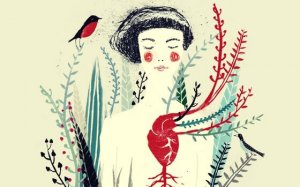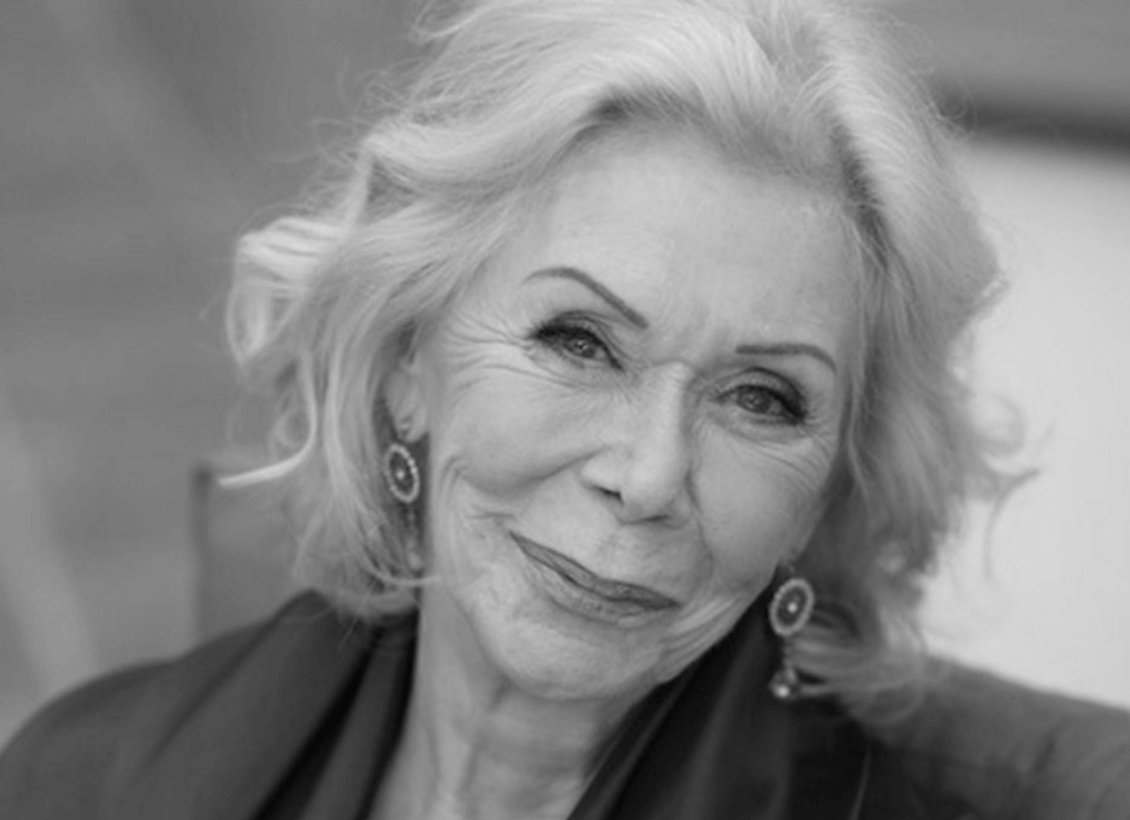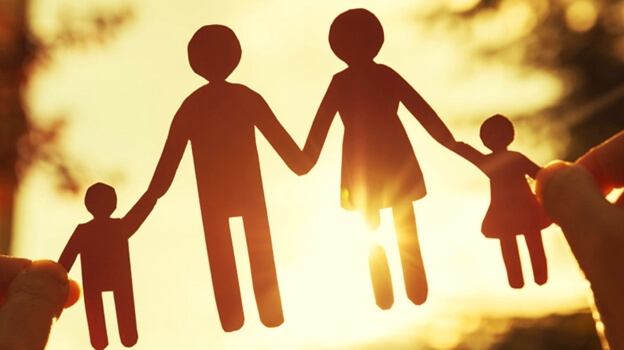Louise Hay and 7 of Her Best Quotes

Louise Hay’s quotes speak of gratitude, love, and healing. They are a true gift for anyone who wants to reflect, learn, and grow on a personal level. A legacy full of wisdom that’s worth reading and remembering throughout our lives.
Louise Hay was an American writer and speaker. She is considered the mother of personal growth and the forerunner of self-help books. Two of her best-known bestsellers are You can Heal your Life (1984) and The Power is in You (1991).
Both make it clear that, to move forward, grow, and strengthen, we have to discover and understand ourselves. They also warn us of the danger it can be to misuse the power of our thoughts.
Her personal philosophy was marked by a traumatic childhood and abuse-filled adolescence. A path full of emotional wounds, roots of low self-esteem that, over the years, she learned to manage through meditation, positive affirmations, and various spiritual practices.
Thanks to this, Louise Hay learned to love herself. She let go of her resentment of the traumatic experiences of her past. She learned to forgive those who caused her so much suffering.
Her quotes are an honest mirror: they transmit everything learned in her exciting journey through life. These are great lessons that should keep in our toolkit for our low days.

Louise Hay: The importance of the present
“The power is always in the present moment.”
The present is opportunity. The most valuable and unique time to act. It’s when we live connected to ourselves and can choose what to do in our lives. Time we can enjoy.
Living in a hurry focused on what we want or enslaved to our past prevents us from feeling the now. Louise Hay was very clear about it: the power to enjoy and change resides in today. The rest is only falsehood or illusion.
Forgiveness as a liberating act
“Forgiveness is a gift to yourself because it frees you. It lets you out of that prison you put yourself in.”
This is one of Louise Hay’s quotes that we really need to keep in mind every day. Forgiving is a liberating act that frees us from the chains of bitterness. A personal decision, not an obligation.
Actually, forgiveness is an enemy of hatred and resentment. It’s an opportunity to heal the resentment produced by that thing that hurts so much.

Understanding our parents’ behavior
“If you want to understand your parents more, get them to talk about their own childhood; and if you listen with compassion, you will learn where their fears and rigid patterns come from.”
This quote from Louise May urges us to reflect on family relationships, although the sentiment can be extended to all kinds of relationships. When you don’t understand your parents, it’s a useful thought to have in mind.
Each one of us is a collection of stories and experiences. An accumulation of circumstances and knowledge built up over time.
Childhood is one of those stages where we are most vulnerable to external influences. We are born as sponges that absorb the world around them.
Hence, many of our behaviors and perspectives on life have their origin in our early years. Everything is an influence.
That’s why it’s important to keep in mind that most of the time each of us acts as best we can, the only way we know. It may not be the right way, but it’s the option we think is best at the moment, based on the weight of our baggage. We all operate this way — our friends, our parents…
Here is another of Hay’s quotes that reflects this very well:
“If your mother did not know how to love herself, or your father did not know how to love himself, then it would be impossible for them to teach you to love yourself. They were doing the best they could with what they had been taught as children.”
In addition, it invites us to reflect on the consequences of emotional wounds in others. If our parents are vulnerable to abandonment or rejection, a lack of self-love, or don’t know how to manage their emotions, it will influence us in some way.
This is especially true during childhood. Their wounds color who they are, influencing their behaviors and how they feel.
Maybe, when we were little, we didn’t understand very well. However, later, as our cognitive abilities developed, we become aware of how deep their wounds are and how they influenced us.
Many of the decisions they made were not conscious. In many cases, they did the best they could. Placing our interests before their own in an exercise of generosity that, as the years go by, amazes us more and more.

Love as the engine of life
“Love is the great miracle cure. Loving ourselves works miracles in our lives.”
For Louise Hay, the discovery of self-love had a clear before and after. Before she loved, she despised herself. She treated herself badly and blamed herself for everything. She was her own enemy.
Once she opened her eyes to love, everything took on a different color. She began to respect herself, take care of herself and value herself as she deserved. From then on, everything changed.
“Love who you are and what you are and what you do.”
Love is the engine of life; a miraculous cure, as Louise Hay says. When it enters our lives, it transforms what it finds in its path.
When we love each other, we have the power to change and rebuild and, above all, to heal our broken parts. Now, if we close ourselves to love, it’s easy to get trapped by suffering, neglect, and stagnation.
Creating what we think
“If I want to believe that life is lonely and that nobody loves me, then that is what I will find in my world.”
This is another of Louise Hay’s quotes that we should never forget. What we believe, we create. The perspective we choose will determine our daily life. Your thoughts have a large say in your reality.
In other words, the quality of our beliefs will grant or take away power. That’s why taking care of our thoughts is so important. They have the power to transform our lives and determine how we feel.
As we can see, Louise Hay left a priceless legacy in her wise quotes. Not only because of what they say, but also everything they inspire.
Through them, she invites us to see the world from another perspective: one where love and forgiveness prevail. Words we can turn to if we need to reflect and grow.
Louise Hay’s quotes speak of gratitude, love, and healing. They are a true gift for anyone who wants to reflect, learn, and grow on a personal level. A legacy full of wisdom that’s worth reading and remembering throughout our lives.
Louise Hay was an American writer and speaker. She is considered the mother of personal growth and the forerunner of self-help books. Two of her best-known bestsellers are You can Heal your Life (1984) and The Power is in You (1991).
Both make it clear that, to move forward, grow, and strengthen, we have to discover and understand ourselves. They also warn us of the danger it can be to misuse the power of our thoughts.
Her personal philosophy was marked by a traumatic childhood and abuse-filled adolescence. A path full of emotional wounds, roots of low self-esteem that, over the years, she learned to manage through meditation, positive affirmations, and various spiritual practices.
Thanks to this, Louise Hay learned to love herself. She let go of her resentment of the traumatic experiences of her past. She learned to forgive those who caused her so much suffering.
Her quotes are an honest mirror: they transmit everything learned in her exciting journey through life. These are great lessons that should keep in our toolkit for our low days.

Louise Hay: The importance of the present
“The power is always in the present moment.”
The present is opportunity. The most valuable and unique time to act. It’s when we live connected to ourselves and can choose what to do in our lives. Time we can enjoy.
Living in a hurry focused on what we want or enslaved to our past prevents us from feeling the now. Louise Hay was very clear about it: the power to enjoy and change resides in today. The rest is only falsehood or illusion.
Forgiveness as a liberating act
“Forgiveness is a gift to yourself because it frees you. It lets you out of that prison you put yourself in.”
This is one of Louise Hay’s quotes that we really need to keep in mind every day. Forgiving is a liberating act that frees us from the chains of bitterness. A personal decision, not an obligation.
Actually, forgiveness is an enemy of hatred and resentment. It’s an opportunity to heal the resentment produced by that thing that hurts so much.

Understanding our parents’ behavior
“If you want to understand your parents more, get them to talk about their own childhood; and if you listen with compassion, you will learn where their fears and rigid patterns come from.”
This quote from Louise May urges us to reflect on family relationships, although the sentiment can be extended to all kinds of relationships. When you don’t understand your parents, it’s a useful thought to have in mind.
Each one of us is a collection of stories and experiences. An accumulation of circumstances and knowledge built up over time.
Childhood is one of those stages where we are most vulnerable to external influences. We are born as sponges that absorb the world around them.
Hence, many of our behaviors and perspectives on life have their origin in our early years. Everything is an influence.
That’s why it’s important to keep in mind that most of the time each of us acts as best we can, the only way we know. It may not be the right way, but it’s the option we think is best at the moment, based on the weight of our baggage. We all operate this way — our friends, our parents…
Here is another of Hay’s quotes that reflects this very well:
“If your mother did not know how to love herself, or your father did not know how to love himself, then it would be impossible for them to teach you to love yourself. They were doing the best they could with what they had been taught as children.”
In addition, it invites us to reflect on the consequences of emotional wounds in others. If our parents are vulnerable to abandonment or rejection, a lack of self-love, or don’t know how to manage their emotions, it will influence us in some way.
This is especially true during childhood. Their wounds color who they are, influencing their behaviors and how they feel.
Maybe, when we were little, we didn’t understand very well. However, later, as our cognitive abilities developed, we become aware of how deep their wounds are and how they influenced us.
Many of the decisions they made were not conscious. In many cases, they did the best they could. Placing our interests before their own in an exercise of generosity that, as the years go by, amazes us more and more.

Love as the engine of life
“Love is the great miracle cure. Loving ourselves works miracles in our lives.”
For Louise Hay, the discovery of self-love had a clear before and after. Before she loved, she despised herself. She treated herself badly and blamed herself for everything. She was her own enemy.
Once she opened her eyes to love, everything took on a different color. She began to respect herself, take care of herself and value herself as she deserved. From then on, everything changed.
“Love who you are and what you are and what you do.”
Love is the engine of life; a miraculous cure, as Louise Hay says. When it enters our lives, it transforms what it finds in its path.
When we love each other, we have the power to change and rebuild and, above all, to heal our broken parts. Now, if we close ourselves to love, it’s easy to get trapped by suffering, neglect, and stagnation.
Creating what we think
“If I want to believe that life is lonely and that nobody loves me, then that is what I will find in my world.”
This is another of Louise Hay’s quotes that we should never forget. What we believe, we create. The perspective we choose will determine our daily life. Your thoughts have a large say in your reality.
In other words, the quality of our beliefs will grant or take away power. That’s why taking care of our thoughts is so important. They have the power to transform our lives and determine how we feel.
As we can see, Louise Hay left a priceless legacy in her wise quotes. Not only because of what they say, but also everything they inspire.
Through them, she invites us to see the world from another perspective: one where love and forgiveness prevail. Words we can turn to if we need to reflect and grow.
This text is provided for informational purposes only and does not replace consultation with a professional. If in doubt, consult your specialist.







